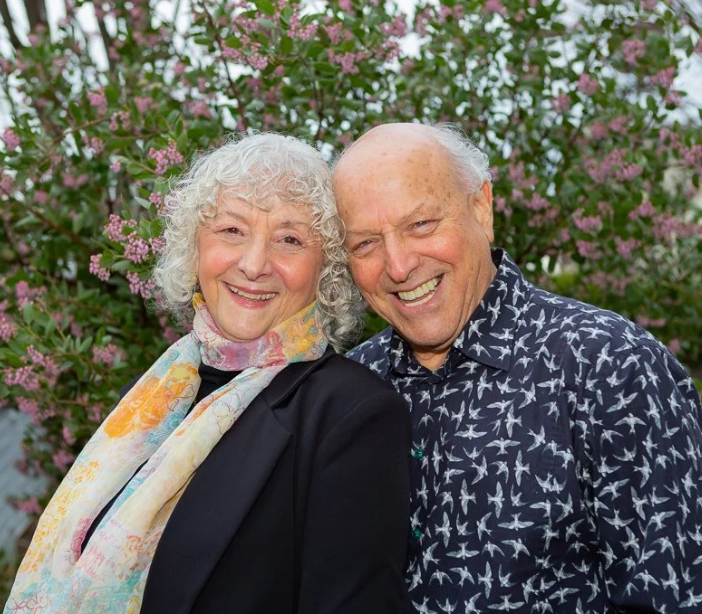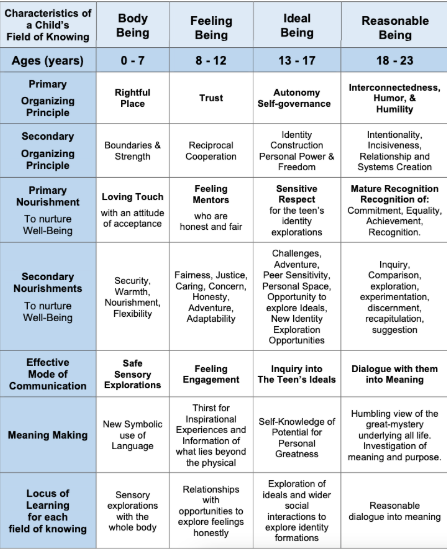Josette Luvmour, Phd. and Ba Luvmour, MA co-created and developed Natural Learning Relationships (NLR), a whole-child understanding of child development. They have studied and explored consciousness since they met in 1979 and have been using Natural Learning Relationships with parents, children, whole families, educators; in experiential learning programs; in seminars, and with schools since the 1980s. Of special note, they have combined their consciousness-based approach to human development with extensive study and fieldwork to bring meaningful Rites of Passage to our times.
Natural Learning Relationships
A guide to the fields of knowing available to humans as they grow.
What is Natural Learning Relationships?
Natural – the essential qualities or inherent capacities which we are born with
Learning – movement through life to gain knowledge, appreciation or mastery
Relationships – mutual respect in which inspiration and wisdom emerge
Thus Natural Learning Relationships describes our essential qualities or inherent capacities (natural) which move us through life to gain knowledge, appreciation or mastery (learning) nurtured by mutual respect in which inspiration and wisdom emerge (relationships).
NLR Defined
Natural Learning Relationships (NLR) is an ontological (Being) epistemology (way of knowing) of human development with wide-reaching applications in parenting, education, and counseling. At its core, NLR maps the development of the innate capacities in children and offers guidelines to creating relationships that lead to optimal well-being for both the child and the caregiver(s).
NLR Applied
NLR practioners include authors, educators, therapists, social workers, parents, counselors, family consultants, non-profit leaders, rites of passage facilitators, and graduate students. Using the holistic approach of NLR, they can work together to nurture the physical, social, emotional, spiritual and intellectual development of your child. Each individual child brings unique gifts and contributions.
NLR helps parents understand how to be in relationship with their children in a way that deepens self-knowledge for all family members. As a comprehensive, thoroughly researched approach to child development, Natural Learning Relationships is a practical yet transformative vision that promotes greater depth and meaning in family relationships.
Learn more!
NLR Basic Elements
The Organizing Principle
Each field of knowing of childhood has a life force that determines the general ways in which human energy, capacities, inclinations, and interaction are structured and how they manifest. We call this the Organizing Principle. The goal of each organizing principle is well-being—and it determines how the child accesses their social, emotional, cognitive, and spiritual capacities (Luvmour, 2006). Each organizing principle operates best in a specific nurturing environment.
Communication
Communication creates the social world in which the child’s self-concept is developed and where their identity emerges. Nurturing optimal well-being by using developmentally appropriate language depends on understanding what the child is capable of valuing, in other words, how the child sees the world. What children value is most driven by the organizing principle and developmental changes that influence perceptions of the world and of self.
The Environment
A child’s environment centers on being-to-being relationships with the primary adult caregivers. Being-to-being learning occurs when the child observes actions (not from the words they hear). These observations build the child’s developmental competencies and gives them a safe and secure base from which to explore. This silent communication occurs between adult and child every day. Included are the adult’s non-verbal attitudes, gestures, and behaviors toward the child.
NLR Central Tenets
The Understanding
Human capacities are innate, they need to be developed, and development occurs in relationship.
The Challenge
What are the capacities of children at different ages and how can they be recognized? Equally important, what kinds of environments nourish the best development of each of these capacities and the child as a whole?
The Response
Natural Learning Relationships™
NLR maps the development of the innate capacities in children at each of four fields of knowing and offers guidelines for creating relationships and environments that promote optimal well-being for both the child and the caregiver(s).
NLR describes in detail the psychological, emotional, and physical experiences that can be provided in each field of knowing of childhood that nourish the whole being. It also describes in detail those things that are harmful to the child’s development.
The parent who is trained in NLR develops an effective understanding of what is happening for their child and how to meet the child’s developmental needs with ease.
Fields of Knowing
Fields of knowing to breathe life into the emergent unfolding of the child’s consciousness. Knowing is derived from “ken” and “kin,” indicating intimacy and wholeness. Fields of learning do provide lots of room to play and be creative. Areas of knowing qualities include fluidity, the curtailing of objectification, how children organize their world, and the opportunity for a child and elder to live in this knowing, this consciousness together.
Fields of knowing also include the dynamics of the transitions between knowing, which contributes to understanding and relating to children. Many, if not most educators, have little experience of changes that occur during the transitions between fields of knowing, so misconceptions and confusions abound, often with dire outcomes to the well-being of everyone.
Changes in development have traditionally been called developmental stages. NLR acknowledges that participating in the child’s consciousness called for descriptors unburdened by the historic terminology of other developmentalists or confined by a word that is currently defined “as a point, period, or step in a process or development.”
Natural Learning Relationships define a field of knowing by how the child organizes their world. Nothing essential is missing for well-being to emerge; Natural Learning Relationships names its fields of learning BodyBeing, FeelingBeing, IdealBeing, and ReasonableBeing. The suffix being means one’s primary or essential nature. The prefix indicates the way the child organizes their world in that field of knowing.
Universality of NLR Human Development:
Anyone can provide developmental nourishments in their own culture in their own way
• Development: Organizing Principle in the child’s field of knowing
• Relationship: The right nourishments, at the right time, in the right way
• Communication: Appropriate to the child’s field of knowing
• Environmental Needs: Relationships shape the developing brain


